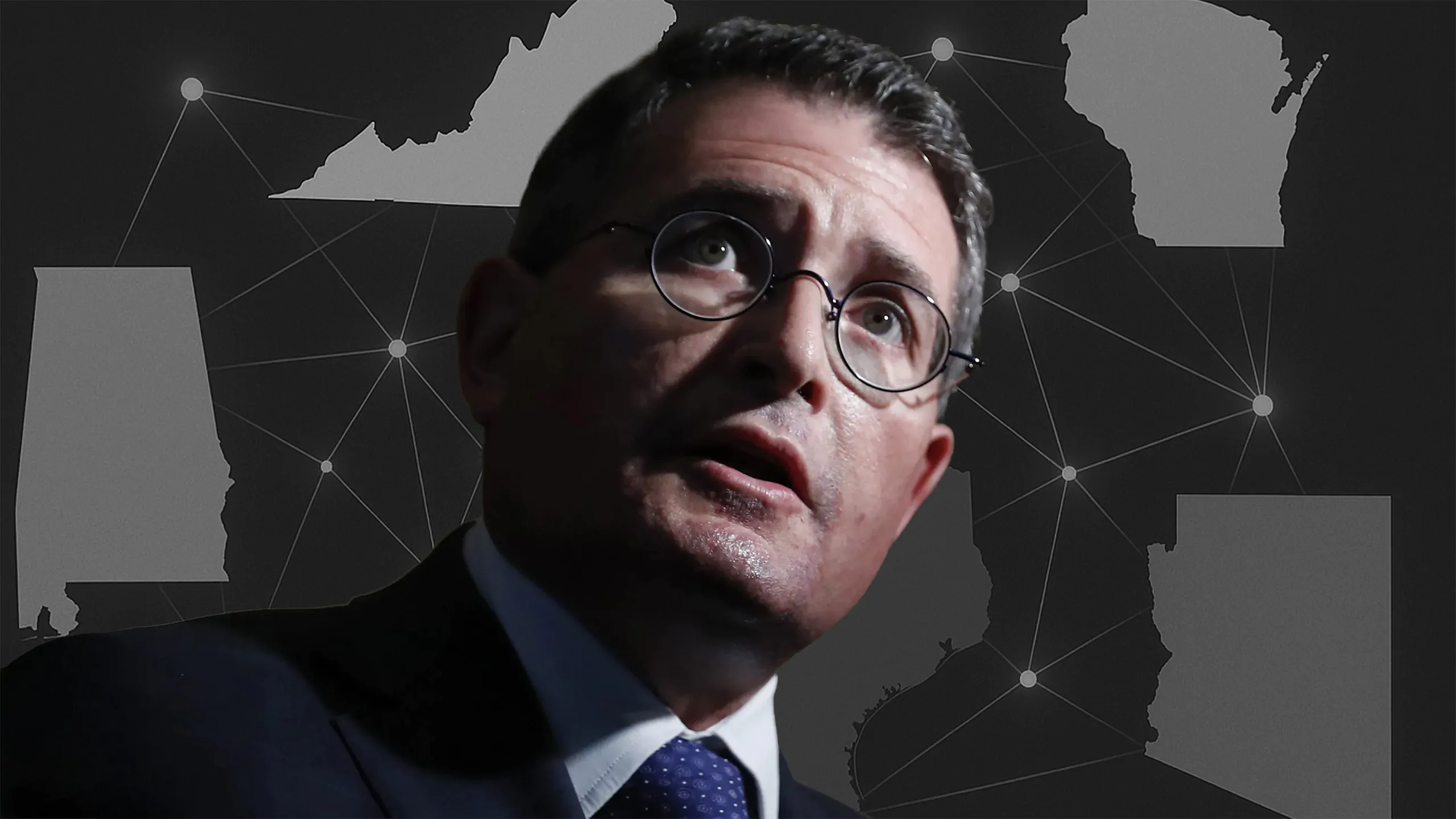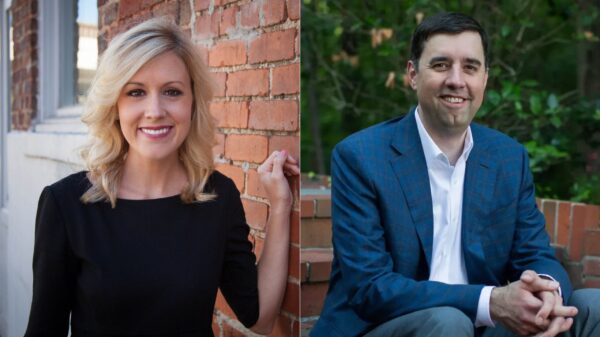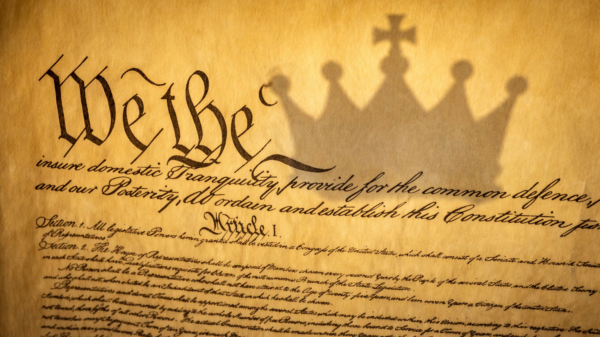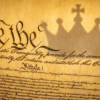Dark money rarely announces itself. It seeps quietly through PAC filings, bland office suites and obscure bank ledgers. But sometimes the mask slips, and the machinery is revealed. Alabama is staring at one of those moments.
More than a million dollars has surged into the attorney general’s race, not from neighbors down the road or even from regional backers, but from the empire of Leonard Leo—the conservative kingmaker who helped reshape the Supreme Court, stitched together a web of nonprofit aliases, and now directs his fortune toward capturing statehouses. Katherine Robertson’s campaign is the immediate beneficiary. But the story is far bigger: Alabama has become the newest battlefield in a national war to control the law itself.
This column draws on public filings and records from Alabama, Virginia, Texas, Arizona and Wisconsin, including campaign finance disclosures, IRS documents and state incorporation records.
The Flood in Alabama
On June 30, Katherine Robertson’s campaign for attorney general reported a $1,000,000 contribution from First Principles Action, Inc. Barely a month later, another $100,000 arrived. Both checks are recorded with the Alabama Secretary of State.
That is $1.1 million from an organization with no Alabama roots. Its address—in a Nashville, Tennessee storefront building—is the same office used by First Principles PAC, which federal filings show is funded almost entirely by the Lexington Fund, a Virginia nonprofit operating under a constellation of assumed names.
According to a close associate within Leo’s network, Robertson was “handpicked by Leo” for this race. When asked directly about the claim, she did not deny it.
For Alabama, the danger is not simply the sum of the money. It is the system that delivered it: a national empire of dark money designed to infiltrate statehouses and courts under a fog of aliases.
The Kingmaker, His Court, and the Split
Leonard Leo has the look of a man who prefers to operate in the shadows. Soft-spoken, bespectacled, almost scholarly in demeanor, he built his career in Washington not by chasing cameras but by cultivating networks. His genius has never been performance; it has been placement. He transformed the Federalist Society from a debating club for conservative law students into the most influential judicial network in modern history.
By 2016, when Donald Trump needed credibility with the right, Leo delivered. He handed Trump a list of vetted potential Supreme Court nominees. From that list came Neil Gorsuch, Brett Kavanaugh, and Amy Coney Barrett—justices who locked in a 6–3 conservative majority.
That majority has already reshaped American law: Roe v. Wade overturned, presidential immunity expanded, environmental protections gutted. For Trump, Leo delivered legitimacy and legacy. For Leo, Trump was a vehicle for long-term institutional power.
But the alliance has broken. In May, Trump lashed out at Leo and the Federalist Society orbit, furious that the network no longer answers to him. To Leo’s allies, Trump is reckless—a liability to the project. The right is now split between Trump’s cult of personality and Leo’s machine of institutions. One man craves loyalty to himself. The other demands loyalty to a cause that outlasts presidents.
That split matters for Alabama. Trump’s bluster may dominate the headlines, but Leo’s empire is the one investing here. If Katherine Robertson becomes attorney general, she will not be Trump’s AG. She will be Leo’s.
The Billion-Dollar Bankroll
If Leo is the architect, Barre Seid was the benefactor. A reclusive Chicago industrialist, Seid spent much of his career out of public view, amassing a fortune in electronics manufacturing. In 2022, he quietly transferred $1.6 billion into Leo’s control—the single largest political donation in U.S. history.
That gift changed the scale of the project overnight. It turned influence into empire.
In a sense, it was the modern equivalent of the fortunes amassed by the railroad barons of the Gilded Age. Just as men like Jay Gould and Cornelius Vanderbilt laid tracks that bound the nation’s economy to their empires, Leo’s network now lays down the legal and political infrastructure to bind courts and statehouses to his design. The rails have changed, but the model is the same: wealth concentrated in the hands of the few, building systems that determine where the rest of the country can and cannot go.
Federal filings show that in just the first half of 2025, First Principles PAC raised more than $2 million, nearly all of it from the Lexington Fund. The PAC’s depository? Chain Bridge Bank in McLean, Virginia—a boutique institution that specializes in political accounts.
The pattern is unmistakable. Money flows from alias factories like Lexington, through PACs like First Principles, and into campaigns like Robertson’s.
The Alias Factories
The genius of Leo’s network is not only its money, but its disguise.
The model is simple: build a nonprofit, then register it under multiple assumed names designed to look like independent grassroots movements. In reality, they are masks worn by the same handful of operatives.
In Texas, The 85 Fund pioneered the approach, adopting names such as Honest Elections Project, Judicial Education Project, Free to Learn, and American Parents Coalition.
In Virginia, the Lexington Fund, a 501(c)(4) created in 2023, filed aliases for Alliance for Consumers Action, American Parents Coalition Action Fund, Honest Elections Project Action Fund, and Judicial Crisis Network Fund.
That same week, the Publius Fund, a 501(c)(3), claimed names including Alliance for Consumers Fund, Honest Elections Project Fund, Judicial Education Project Fund, and Save Our States Fund.
To the public, these names suggest broad civic coalitions. To the filings, they are one machine operating under different masks.
The Operatives
If Leo is the strategist and Seid the financier, then these are the hands that keep the empire’s gears turning.
Oramel H. Skinner is a lawyer of sharp intellect and sharper ambition. Once Arizona’s solicitor general, he now appears as director and signer on filings for both Lexington and Publius. His career traces the revolving door from state office to nonprofit advocacy, illustrating the personnel pipeline that powers Leo’s network.
Neil Corkery is the old guard. For years, his name has appeared in IRS filings as custodian of records or treasurer for Leo-linked groups. A financial manager by trade, Corkery represents continuity—the keeper of the books, ensuring the network’s paperwork survives scrutiny while never fully revealing its donors.
Peter Bisbee is the bridge-builder. A longtime operative in Leo’s political circle, Bisbee founded First Principles Action and formerly served as executive director of the Republican Attorneys General Association, RAGA—itself a central cog in Leo’s national strategy. His presence ties Robertson’s campaign directly to the broader project of cultivating a bloc of attorneys general loyal to Leo’s machine.
Kayla Glaze is the newcomer. Young, little-known outside of filings, she is listed as treasurer of First Principles PAC. In the first six months of 2025, her reports documented millions raised and disbursed in rapid succession. She represents the next generation of operatives: new names and signatures to keep the cash moving.
Arizona: The Personnel Pipeline
Arizona has been a proving ground. As solicitor general, Skinner coordinated multi-state lawsuits challenging federal authority on immigration, voting and reproductive rights. Now his name surfaces on filings for Leo’s nonprofits, illustrating how the line between public service and outside advocacy can be blurred.
The lesson is clear: the pipeline from government office to dark money entity is not accidental. It is part of the design.
Wisconsin: The Laboratory of Control
Wisconsin shows how the model works in practice. Conservative groups aligned with Leo, including the Judicial Crisis Network, poured millions into state supreme court races over the past decade. The result was a conservative majority that upheld gerrymanders and restricted voting rights.
When progressives flipped the court in 2023, the network did not retreat. It adapted. New branding—including Save Our States and Honest Elections Project, now legally filed as aliases of Publius and Lexington—reemerged in national election-law battles, including fights over redistricting and voting rules.
The lesson for Alabama is simple: When the network loses control, it rebrands and redeploys until it regains it.
The Warning
This is not about Katherine Robertson alone. It is about a design perfected over decades. Arizona supplied the operatives. Wisconsin tested the electoral laboratory. Texas and Virginia built the shell factories. And now Alabama stands as the newest battlefield.
This is how democracies erode. Not in a thunderclap, but in the slow seep of dark money through anonymous banks and recycled names. Not in a single dramatic collapse, but in years of signatures, filings, and candidates groomed to serve interests beyond the people they claim to represent.
The paperwork leaves no room for doubt: the aliases, the Nashville office, the billion-dollar bankroll, the handpicked candidate. The warning is as stark as ink on a ledger.
The Gilded Age railroad barons once built private empires that dictated who could travel, where goods could move, and at what price. They were not stopped by conscience, but by public outcry and reform. Leo’s empire follows the same pattern—only this time, the tracks are legal, not steel.
The question is whether we will see the design in time, or whether concentrated wealth will again chart the nation’s course in secret.
Alabama is not just facing a race for attorney general. It is confronting the machinery of a national empire determined to write the law from the shadows.
This is not politics as usual. It is a test: whether justice in America remains the people’s instrument—or becomes the private possession of the few.




















































